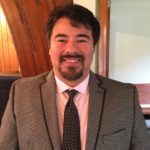Last week we talked about leprosy and how it was a very destructive and scary disease. There wasn’t a cure and the measures which had to be followed to protect the community were isolating and lonely. This was essentially a death sentence. It’s comparable to the diagnosis of cancer these days. Being diagnosed with cancer is scary, especially considering treatments, if there’s even an option for treatment. It spreads, takes over and without a cure or healing, the body will waste away until death claims the victim. It’s truly a sad horrible picture. And just as have that in mind when we think of disease, but even more than that, this is how we must view the nature of sin. Sin may be pleasurable for a season, but the wages of sin is death. It never turns out alright, it never satisfies. Most of us would concur. But have you thought of beyond the nature of sin to the nature of the sinner? Let me give you a phrase to think about: “God loves the sinner but hates the sin.” Anyone want to amen that? Is that a biblical view? Actually some say that quote is more attributed to Ghandi in his autobiography. So what does the Bible actually say? “The boastful shall not stand before your eyes; you hate all evildoers. (Psalm 5:5) “The LORD tests the righteous, but his soul hates the wicked and the one who loves violence.” (Psalm 11:5) That doesn’t sound like “love the sinner” language. It’s important for us to grow in our understanding of God’s Holiness, His Holy character, and how offensive sin is to Him. Then these biblical statements will not seem out of place. This is why we read and study Leviticus. Just as we can look at the disease of cancer with moral outrage and righteous indignation, so think about how God views our sins. Small sins, small things we think are petty or don’t amount to much, God holds righteous indignation against. God does show his love and mercy and kindness to us in that, “but God shows his love for us in that while we were still sinners, Christ died for us.” (Romans 5:8) But this saving love is not given for everyone. God’s love is gracious, not demanded, not owed, not merited. So when a leper was healed, it was by the grace of God, a demonstration of his kindness. And so when one was healed, there was a law for how the leper would be declared clean and allowed to re-enter into community. And this is what we are going to look at this morning.
Last time we met we talked about fear and how going through this experience in our lives, how dealing with COVID-19 has a lot of people worried. Indeed as the numbers of infections continues to increase to over 1000, and the number of deaths also continues to rise, people are wondering, “Is there an end in sight?” I just learned yesterday that Greg’s friend Lenny in Long Island, who we’ve been praying for, was one of those who succumbed to the virus. Gratefully, we can see that the virus has not targeted the young, but still there is an uncertainty during these times that can be stressful, and cause anxiety. While it seems we’ve made it past the toilet paper panic, some have begun to wonder is this judgment from the hand of God? Are we under God’s judgment? And not only us but the rest of the world? The prophetic books are helpful in these times as they were when they were originally penned. But what prophetic books are meant to do is to encourage and remind ourselves of God’s promises. We aren’t to try to figure out a road map, as if God left us a puzzle that will give us some kind of gnostic insight so we can sit back boasting in that we had the end of the world figured out. So with that in mind, let’s look to Joel and see what God’s message is for us this morning.
Last week we talked about making unintentional mistakes. But some mistakes we make have an associated cost. I remember one fine summer evening in Houston, and I was weed trimming around the house and I ran my weed-eater and sliced right through one of the sprinkler system pipes. All of a sudden I have a water geyser shooting 20 feet up in the air and now I’m soaked, and I’m mad, and so then I had to call a plumber to fix my mistake. And of course you don’t do yard work in Houston during “normal” business hours, you do it in the evening when it cools off, so now I have to pay even more expensive “after hours” call. Some mistakes will affect your pocket book. Another time, I thought I would get ahead and do some preventative maintenance and change out the brakes on one of my cars. The front disc brakes went smooth, but the rears were drum brakes, and I was, needless to say, way in over my head. After managing to crack a brake line, spill out all the brake fluid on the driveway and royally messing up the brakes , I had to call a tow truck to tow it to a garage and have them fix the mess I had made. So much for prevention, so much for maintenance. It was just a flat out screw up that was expensive. Dave Ramsey likes to call these mistakes stupid tax. And over the years I have certainly paid my fair share of stupid tax. All of this to say that sometimes when we make mistakes, there is a price to be paid.
